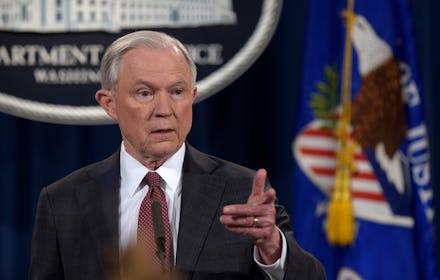Attorney General Jeff Sessions reportedly used campaign funds to meet with Russian envoy

Despite the Trump administration's claim that Attorney General Jeff Sessions was solely acting in the capacity of a U.S. senator when he met with a Russian ambassador during the Republican National Convention in Cleveland, campaign finance records show Sessions paid for travel expenses using his own political funds, the Wall Street Journal reported.
According to the Journal, a person who attended a Heritage Foundation event during the RNC said that Sessions spoke about Donald Trump's presidential campaign at the event, effectively acting as a surrogate for the then-Republican frontrunner during the trip. Sessions also spoke at the convention on its first night, praising Trump and speaking largely about trade and immigration.
The discoveries that Sessions used political funds to foot his travel bill and that he discussed Trump's campaign during the same trip in which he met with Russian ambassador Sergey Kislyak challenge the White House's assertion that Sessions' communication with Kislyak was just business as usual for a Senator and had nothing to do with his role with Trump's team.
"He did acknowledge that he met in his capacity as a United States senator on the Armed Services Committee with the ambassador on a couple occasions, one being after he had given a speech and someone approached him," White House press secretary Sean Spicer said during a Thursday briefing. "And as you've seen, senators like Ted Cruz have come out and said this is a perfectly normal course of business. So I think this is Democrats continuing to push a false narrative for political purposes."
Failure to disclose
During Sessions' confirmation hearings in January, Senator Al Franken (D-Minn.) asked Sessions to comment on a CNN report claiming that intelligence community documents provided to then-President-elect Trump included information showing a "continuing exchange of information during the campaign between Trump surrogates and intermediaries for the Russian government." Franken asked Sessions, "If there is any evidence that anyone affiliated with the Trump campaign communicated with the Russian government in the course of this campaign, what will you do?"
Sessions responded, "I'm not aware of any of those activities. I have been called a surrogate at a time or two with that campaign, and I did not have communications with the Russians."
After news broke that Sessions had indeed met and communicated with Russians during the campaign, lawmakers on both sides of the aisle began calling for Sessions to recuse himself from any involvement in probes relating to the 2016 presidential campaign. Rep. Jason Chaffetz (R-Utah), who chairs the House Oversight and Government Reform Committee, tweeted Thursday that Sessions "should clarify his testimony and recuse himself." House Minority Leader Nancy Pelosi (D-Calif.) released a statement calling for Sessions to resign. Pelosi and DNC Deputy Chairman Rep. Keith Ellison (D-Minn.) both stated that Sessions committed perjury, with Ellison noting that perjury carries a punishment of up to five years in prison.
Trump released a statement Thursday night claiming that Sessions "did not say anything wrong" and that revelations about Sessions' involvement with Russians — and his decision to outright deny communication with Russians while under oath — is a "total witch hunt" put on by the Democrats merely attempting to "save face for ... losing an election that they were supposed to win."